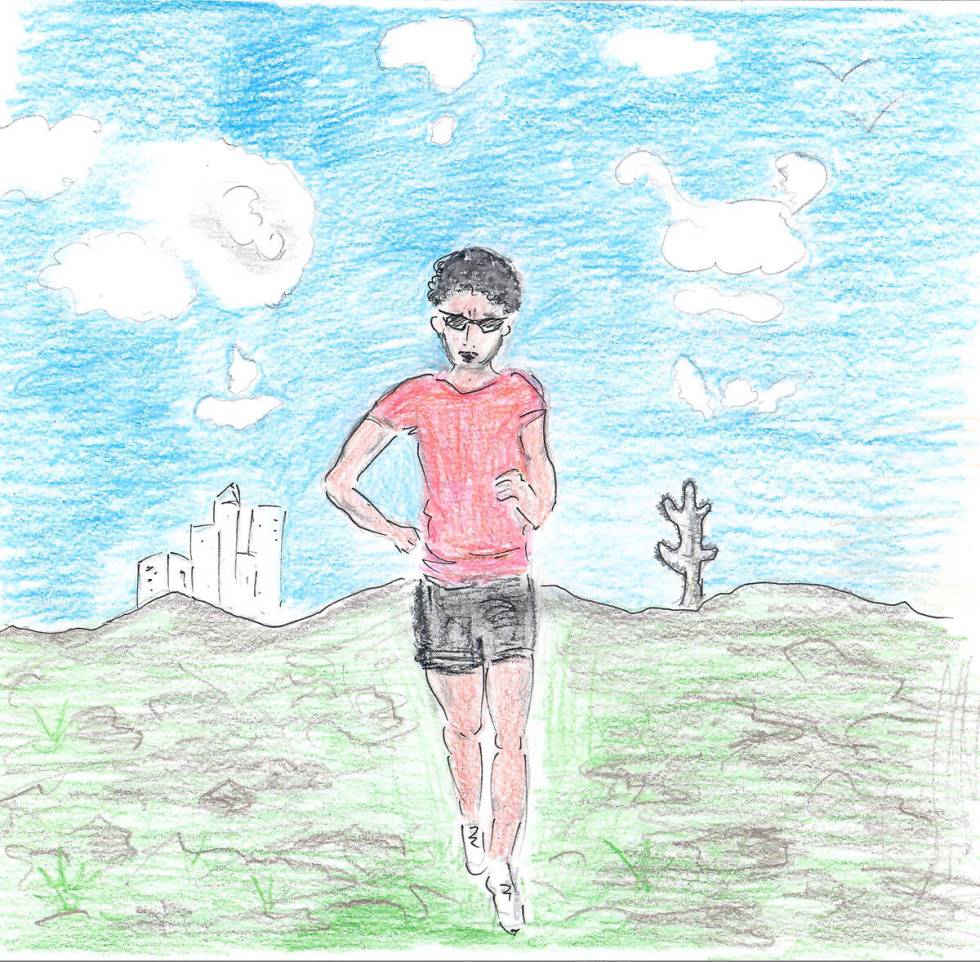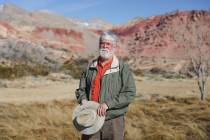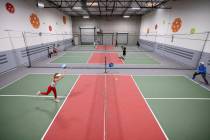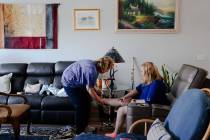The Meanings of My Marathon
I started running again last September. First time in … five years? Probably longer, but maybe you’ll spot me five, because I’m turning 50 this year and could use a break. The plan was this: Start training to run the 2023 Portland Marathon, held at the beginning of October — one day after my 50th birthday. And 20 years, almost to the day, since my first (and only, so far) marathon, also in Portland.
I remember the ecstasy of sprinting the final 300 feet, crossing the finish line downtown, then wrapping up in a Mylar blanket, recharging on food, waiting for my friends to finish. My time, well over four hours, was not remarkable — senior citizens breezed past me from start to finish, and I was content to wave them on. Crossing that line was a moment of finally following through on a plan, a wish, a dream.
Afterward, I had visions of a dynasty. I’ll run one every year! I have the body type to get really good. Qualify for Boston. Yeah.
Yeah … no. In the years that followed, I managed two half-marathons. I ran the Vegas Half down the Strip but pulled up lame near the end and had to walk the rest of the way. There was that blissful run under a rapturous, full-moonlit August night on the World’s Loneliest Highway a few hours north of town. But that was at least a decade ago. No — longer. I can’t remember.
I tried this “anniversary run” thing once before, when I attempted a marathon at age 40. That was a lark. I trained with no real plan for several weeks and had one great seven-mile run. I remember striding off Pyramid Hill in the southwest end of town, running tall, surveying the whole city, a conquering warrior. I can still feel the strength of those strides. A day later my body gave out and I could barely move for a week. And that was the end of that.
Until now.
Let me tell you, running this past September was great! Nice easy runs of two or three miles through the neighborhood and up to the nearly completed county park at the base of Desert Hills. Beautiful views across the city; mountains in every direction, endless blue skies.
I found an easy mind. Running is best when your mind and body settle in, a mile or so into a run, past the anxiety, the jitters, the insecurity, the obligation of it all, and into a glistening meadow of easy breathing, soft heel strikes and a sense that you could go forever.
Then October hit, and a wave of depression and lethargy wrapped me up and body-slammed me. A year of picking up various pieces had finally caught up to me. The runs stopped.
Until now.
W
ellness is the buzzword. A platter of mental, physical, relationship, dietary, financial, spiritual, social optimization mantras, habits and hacks to find your best self. Self-help. Self-care. It’s all the same thing. It seems a curiously middle class thing … like the working poor are just trying to hang on, and the rich (so they tell us) have already arrived. The rest of us have a little time on our hands, so why not use it in the relentless quest for betterment?
John Patrick Leary, in his book Keywords: The New Language of Capitalism, tracks the modern development of wellness to physician Halbert Dunn, who in a 1959 article urged doctors of his day to focus less on patients’ illnesses and more on their health, in order to “fashion a rational bridge between the biological nature of man and the spirit of man,” a quality that “transcends physiology and psychology.”
Sounds good to me. There’s so much fun data to catalog in the run-up to a marathon. So many new rabbit holes on YouTube to explore! Dietary supplements. Stretching routines. Core work. Rest and recovery days. Proper paces and times. The right gear. The right app — because there’s gotta be an app tied up in all of this.
But critics of wellness, such as Leary, see it as a fundamentally deceitful marketing word designed to maintain the status quo. Leary’s book — which tries to unpack and critique these sorts of common buzzwords that rule our lazy minds — notes, correctly, that wellness has become a “staple” of health insurance and the workplace. He also notes, somewhat cynically, that wellness matters because “employees’ health and happiness will minimize their cost to the company and maximize their productivity at work.”
It comes down to how you think about the middle class: bougie, aspirational, well-educated strivers, in which case the argument has some bite? Or overworked, overeducated, harried, one-paycheck-from-ruin worker bees? In the latter definition, Leary’s critique fades — and self-care becomes a legitimate survival strategy.
Carl Cederström and André Spicer take Leary’s critique further in their book The Wellness Syndrome. “The more we concentrate on maximizing our wellness, the more alienated and frustrated we seem to become,” they write. All this is a desperate move, they write, that encourages an “infectious narcissism which pushes us to take the last great turn inwards, making our body into our first and last concern.”
For the wellness ideology not only leads to greater stress — wellness is a road with no endpoint — but also encourages a solipsistic escape from political action. Your salvation lies in improving yourself, not in joining with others to improve things for all. To its critics, wellness is really an act of running away from the lived imperfections of the world and the political systems that nourish them.
H
am running to get in shape. But I’m also running away, too. I’m running because I am desperate. My wife and I have been trying unsuccessfully for five years to have a baby — five years of failed pregnancies and waste-of-time IVF cycles. We are both of an age where our reproductive material is fading in quality. So who knows what comes next. Donor eggs? Adoption? The former requires healthy sperm. The latter requires I discover the fountain of youth.
So this marathon is really a quest to outpace my feelings of failure and worthlessness. The inability to conceive a viable human life with your partner — that THING that, when you strip out all of the noise of the modern world, can feel like the only thing that actually matters in this world — has left me feeling sad and helpless and empty and angry. Pregnant women, babies in strollers, children at play, the growing adolescents of friends and family … suddenly everywhere!
Nowhere to run.
The traumas of infertility are real, and persistent and unfolding … but they’ve started to become … weirdly comfortable. Like it’s an invitation to hang out there at the edge of this darkness forever, never fully falling in but never moving on. For me it’s starting to feel like self-absorption.
Of course, marathon training is also an act of self-absorption. That’s actually sort of the point, a test of your physical resilience and your mental commitment … a quality to be praised, not criticized. I miss the feeling of being in good shape. The only time I felt really good physically — which is distinct from simply not feeling bad — was in the five-month run-up to Portland. I was 29. I was living in New York, starving, bouncing among rooms across Manhattan and Brooklyn, which may sound glamorous but mostly wasn’t. The city I came to love wasn’t the city of cool hangouts with cool friends and lovers in cool places. It was solitary runs from the northern tip of Manhattan to Battery Park, forays toward the far ends of Brooklyn, from East New York to Coney Island, zigzags across the great bridges spanning the East River — all as a chilly, wet May became a blissful June became a hot but agreeable July became a muggy August.
No music. Just the street, people, cars and the sounds of my own breathing and strides meeting the pavement. I sought a state where my movement was silent, like a bird in flight, a moment my friends and I jokingly dubbed “Zen disintegration.” One day, in north Harlem, I glided past a woman on the sidewalk and obviously startled her. She was not happy.
“You better keep running!” she shouted behind me.
I’m trying. For a few months, it was just short walks. In the cold and rain. Plenty of hydration, trying to stretch, trying to manage my diet. Recording every ache and pain. The critics bemoan the gamification of our lives, and I agree in spirit with them, but I’ve always been a chart-maker. The solace they provide in a world of information overload typically outweighs the neurosis of constantly making and fretting about them.
This month: longer walks, and my first short runs, which have pummeled my quads but buoyed my spirits. Then we build from there.
Cederström and Spicer believe we can escape the “wellness syndrome” if only we can manage “to stop obsessively listening to our bodies, to give up fixations with our own health and happiness and to abandon the illusion of limitless human potential. Instead we could forget about our bodies for a moment, stop chasing after happiness and realize that, as human beings, we are not just defined by our potential to be healthy and happy.” We are defined by our impotence, our failures. There’s no shame in this, they write. “What makes most important things in life worthwhile is the inevitable failures and pain they entail.”
I know what it’s like to define yourself by failure. It may sound liberating, but mostly it isn’t. I suppose true wellness comes from accepting the sad knowledges of the world, its random suffering and the inexplicable mysteries of other human beings and your own heart, its beautiful but fleeting joys, and moving forward … always forward … to anywhere.
Gotta go — trying to get that next run in before the sun goes down. ◆













